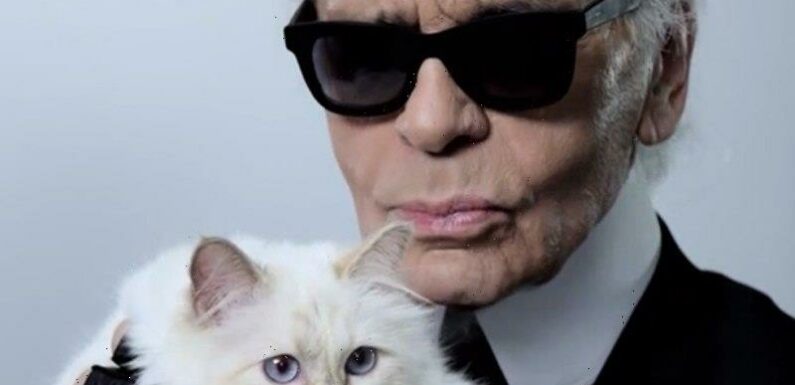
The 2023 Met Gala will honour none other than Chanel legend – the pony-tailed man in shades – Karl Lagerfeld. Tracking the late designer’s 65-year career working with labels such as Chanel, Fendi and Chloé, “Karl Lagerfeld – A Line of Beauty” will celebrate how the creative director’s 2D sketches transformed into tangible clothes.
It is the third designer-themed gala in history following Alexander McQueen in 2011 and Rei Kawakubo, founder of Comme des Garçons, in 2017. The exhibit will showcase more than 150 garments.
Karl Lagerfeld with models Cindy Crawford, Linda Evangelista and Claudia Schiffer after his spring-summer show for Chanel in Paris, 1995.Credit:AP
By the time of his passing in 2019, Lagerfeld had become almost as famous as the stars he dressed, including Julianne Moore, Cindy Crawford, and Pharrell Williams. Revered for his use of large pearls, bouclé suits, and quilted handbags, he transcended trends and defined the runway’s future.
Despite his unquestionable talent, Lagerfeld was not without controversy. He has been criticised for calling singer-songwriter Adele “a little too fat”, and for expressing annoyance with the #MeToo movement. He also criticised the acceptance of refugees in France on the French talk-show Salut les Terriens in 2017, and sent flowers to former IMF chief Dominique Strauss-Kahn after he was accused of sexual assault.
The fashion industry is peppered with instances like these, where the elevation of beauty and glamour clashes with a lack of social awareness.
Lucianne Tonti, a regenerative fashion researcher, says while the Met Gala is generally just a big beautiful party (“fashion’s biggest night out”) and therefore somewhat exempt from being entirely “woke”, it should still reflect the society we strive for.
“Honouring a white, male designer who was unashamedly cruel, racist, fat-phobic and often displayed misogynistic tendencies is out-of-step with the values of this moment,” she says. “It’s time for fashion to stop acting like it’s glamorous to be mean. It’s not chic to be cruel, I don’t care how talented you are.”
The industry is crippled with a “short memory”, says Tonti, overlooking “transgressions for the next social media moment or hyped collection”. A recent example is Kim Kardashian’s partnership with Dolce & Gabbana at Milan Fashion Week this year – a collaboration venerated for its throwback to the 90s and 2000s despite the label’s troubled history of homophobia and racism.
“[Fashion] has largely managed to escape the wrath of the #MeToo movement despite having a history of ableism, a troubling obsession with youth, and being built on the exploitation of women from garment workers, to unpaid interns, to young models,” says Tonti, the author of Sundressed.
Fashion lecturer and researcher Daphne Mohajer va Pesaran says fashion at expensive exhibitions like the Met Gala, can become insular, based on niche ideals, and hyper-focused on the visual alone. Yet political commentary is “embedded in the garments they wear, quite literally in their silhouettes, cuts, dyes, fibres, and seams”, she says.
Designers are not scrutinised as much as other public figures – or even others within the fashion industry, Mohajer va Pesaran says. Two successful fashion photographers, Bruce Weber and Terry Richardson, were ousted from various fashion magazines (including those owned by Condé Nast) following multiple accusations of sexual harassment. Several designers, however, continue to fly under the radar.
Karl Lagerfeld attends The Museum of Modern Art Film Benefit tribute to Pedro Almodovar in 2011 in New York.Credit:Evan Agostini
Alexander Wang returned to fashion after facing sexual misconduct allegations in 2020, the NGV celebrated Chanel last year despite her Nazi affiliations, and John Galliano bounced back as creative director of Maison Martin Margiela after his antisemitic remarks in 2011. Even the previous Met Gala theme, gilded glamour, seemed out of touch given it was held when COVID-19 deaths and financial strain were key global concerns.
On the other hand, fashion could distract us from troubling matters, says associate dean for fashion enterprise at RMIT, Stephen Wigley. But it requires delicate balance. “For something like the Met Gala, you know, it’s exciting, it’s glamorous, it’s a celebration of fashion. But it can’t be immune to issues that are very relevant to people’s lives. It at least has to have a response and a rationale to criticism.”
Much of the allure behind major designers like Lagerfeld is their provocative behaviour. “It wasn’t just his creativity and vision as a designer, but his personality which was obviously very carefully curated,” says Wigley.
People buy into the alternate world offered by designers that are almost “mythological” in the eye of the beholder – totally separate from everyday life and able to present the world through a different lens, Wigley explains. Fashion becomes a beautiful, ornate space, demarcated from a less-than-perfect reality.
“Part of the drama around fashion is around these people having quite far-out opinions,” Wigley says, adding that luxury designers cater to a smaller demographic, which could mean less risk of offending the masses.
Do such opinions warrant public firing?
Dr Jessica Ford from the University of Newcastle’s Gender Research Network says a celebrity being “cancelled” doesn’t necessarily necessitate accountability.
“No one with a media platform, serious cultural capital, and economic power ever really gets cancelled. Most of the people that have been cancelled have effectively managed to maintain their careers [or] reformulate them in a different way,” says Ford. “See Louis CK, Mel Gibson, Dave Chappelle.”
That’s not to say cancel culture is completely null-and-void. “What I think we can learn from these public outcries is … that the status quo has changed in ways that move whiteness, capitalism, and patriarchy away from the centre, even if just a little.”
Make the most of your health, relationships, fitness and nutrition with our Live Well newsletter. Get it in your inbox every Monday.
Most Viewed in Lifestyle
From our partners
Source: Read Full Article

